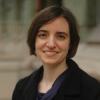As a young woman studying religion in college, my friend and I traveled to hear Mary Daly speak in the late 1990s. After the lecture, I took a picture of my friend leaping high and holding a bumper sticker touting Mary’s memorable phrase: “Sin Big.” I don’t recall much of the specific words that I heard that evening beyond those, but I remember the idea: women mattered.
In a culture where ideas often encourage women’s soul-shrinking, Mary Daly called women to live large. Her famous phrase “sin big” came from her study of the word “sin” whose etymology has roots in the word “to be.” As such, Mary’s theology called women to be big; to sin against or break through patriarchal ideological and material barriers that do not support women’s -- or men’s -- lives.
The beauty of a brilliant idea is that it does not remain one. It is transformed into flesh and bone and breath. People try on an idea and, if it does them justice, will wear it forever. It becomes part of them and their living.
Since Mary Daly’s death, many obituaries in news outlets ranging from The New York Times to The Associated Press have remarked on her intellectual contributions. Last week, The Wall Street Journal posted a guest op-ed titled, "As the Flame of Catholic Dissent Dies Out." Its author made the mistake of assuming that ideas die with the person who sparked them, instead of living on in the people who believe them.
I do not believe the flame of theological dissent is dying out. Whether it is Martin Luther King, Jr. -- whose life we commemorate this week -- or Mary Daly, theological dissent breaks through our numbed collective consciousness. A groundbreaking idea can open for us a space or a new discourse in which we are able to dream big and see ourselves as God sees us. A new idea elevates us, as Martin Luther King, Jr. suggested, and allows us to glimpse the Promised Land as we never have before.
Feminist theology -- and its sister theologies of Asian, eco-feminist, mujerista and womanist theologies to name a few -- have done just that. Once fledgling ideas bound into paperback books, they have since helped us lift ourselves out of a consciousness rooted in gender inequality. Women and men have been freed to live our new ideas in classrooms, churches, bedrooms and boardrooms. Feminist theology helped ignite a movement that transforms the way we live and the way we pray; the way we see ourselves, one another and even God.
To the author of The Wall Street Journal article, I humbly offer the fact that I am but one among thousands of young Christian women and men who do not permit the flames of theological dissent to be extinguished. We are here tending the fires of hope. We spend our days putting out the fires of sexism and racism and homophobia. And by night we carry the kindling of justice and spirituality in our hands.
As young Catholics, we are indebted to our theological forebears, like Mary Daly, who helped us to understand that God created us equal -- equal in gender, race and more. We may not embrace everything about a person and their writings, but in some way we have been transformed by a key idea that opened up new ways of thinking. And, in turn, we hope to transform what we can of our church and society. This is what happens when an idea catches fire. It helps us illuminate the world.
Nicole Sotelo is the author of Women Healing from Abuse: Meditations for Finding Peace, published by Paulist Press, and coordinates www.WomenHealing.com. A graduate of Harvard Divinity School, she currently works at Call To Action.




